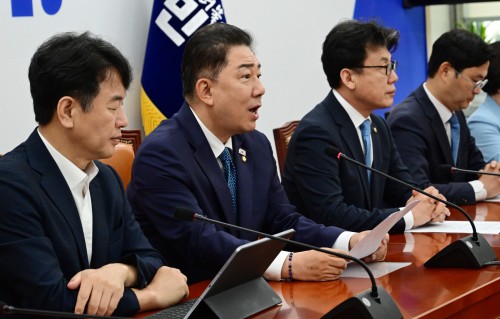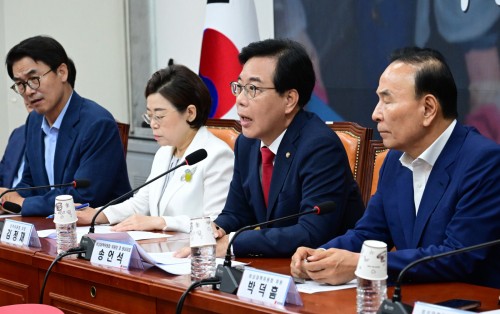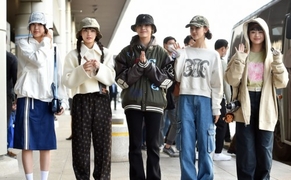 |
| Kim Byung-ki, acting leader and floor leader of the Democratic Party of Korea, delivers opening remarks during a policy coordination meeting at the National Assembly in Seoul on July 31. / Source: Lee Byung-hwa |
 |
| Song Eon-seok, acting leader and floor leader of the People Power Party, speaks during an emergency committee meeting at the National Assembly in Seoul on July 31. / Source: Lee Byung-hwa |
Political reactions diverged sharply over the Korea-US tariff agreement. The ruling Democratic Party of Korea (DPK) hailed it as a pragmatic diplomatic success that safeguarded national interests and food security, while the opposition People Power Party (PPP) criticized it as involving excessive U.S.-bound investments and raising concerns about the auto industry's competitiveness.
During a policy coordination meeting, Kim Byung-ki, acting DPK leader and floor leader, said, "The tariff negotiations with the U.S. have been successfully concluded. This reaffirms President Lee Jae-myung's and the government's commitment to protecting the livelihoods and food security of our people, thus reinforcing economic recovery efforts."
Senior DPK lawmaker Moon Jin-seok called the deal “much better than Japan’s recent agreement,” pledging full support for "pragmatic, national-interest-centered diplomacy." Lawmaker Kim Young-jin noted, “It’s a standard-level agreement: 15% tariffs with $350 billion in U.S. investment—comparable to the EU and Japan.”
DPK leadership contenders echoed this sentiment. Candidate Jung Chung-rae said, “Negotiating with the U.S., the world's superpower and our key ally, is extremely challenging. Yet Korea managed to outperform Japan and the EU and earned most-favored-nation treatment.” Park Chan-dae added, “The $350 billion strategic industry cooperation fund will bolster Korean firms expanding into the U.S.”
Conversely, PPP leaders expressed concern. Acting chairman and floor leader Song Eon-seok acknowledged the negotiation team’s efforts but noted, “Combining $350 billion in U.S. investment with $100 billion in LNG and energy purchases, the $450 billion total surpasses our $410.2 billion foreign reserves. This amount seems excessive.”
Song also questioned discrepancies between Seoul’s stance and U.S. President Donald Trump’s social media post, which claimed “agriculture is included and tariffs are zero,” urging clarity on agricultural market access.
PPP lawmaker Na Kyung-won argued, “The devil is in the details. While figures align on paper, a 0% car export tariff jumping to 15%, or from 2.5% to 15%, significantly affects industrial competitiveness.”
Lawmaker Joo Jin-woo warned, “The $487 trillion (approx. $350 billion) investment condition risks dampening domestic investment. The government must support firms now burdened with both tariffs and U.S. investment obligations.”
Most Read
-
1
-
2
-
3
-
4
-
5
-
6
-
7





















